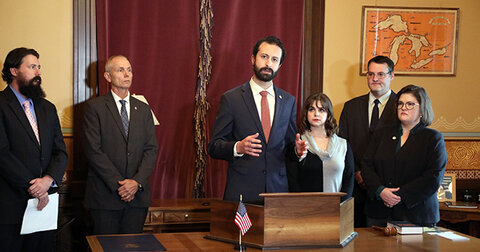Michigan bill demands 100% transition to green energy by 2035
Renewables only account for 11% of Michigan’s energy today, so how could they make up the rest by 2035?
If zero is the most dangerous number in government, House Bill 6524 shows that 100% isn’t far off.
House Bill 6524 of 2022, proposed on Nov. 29 by Rep. Yousef Rabhi, D-Ann Arbor, shows the dangers of an all-or-nothing mindset in government. Rabhi, the House minority floor leader, proposed a bill that would, according to MichiganVotes.org:
[M]andate that 100% of the electricity sold in this state be from sources defined as “renewable” (subject to a broad range of exceptions and exceptions), and empower state officials to grant a different menu of exemptions and exceptions as specified in the bill.”
The 100% target would need to be hit in 2035 and thereafter, the bill says.
According to the U.S. Energy Information Administration, Michigan got only 11% of its energy from renewable sources in 2021. The other 89% came from coal (32%), nuclear energy (30%) and natural gas-fired power (27%).
Jason Hayes, the Mackinac Center’s director of environmental policy, has warned that Michigan is not ready for an immediate or arbitrary transition to wind turbines and solar panels. A premature transition, he wrote in The Wall Street Journal, would leave Michigan vulnerable to “cloudy, windless days.”
Rabhi’s bill would do the same.
CapCon requested an interview with Rabhi, but never heard back. Had he responded, we would have asked the same question we’re left with today: How do renewables go from 11% to 100% between 2022 and 2035? What is the realistic path from A to B?
Michigan Capitol Confidential is the news source produced by the Mackinac Center for Public Policy. Michigan Capitol Confidential reports with a free-market news perspective.

